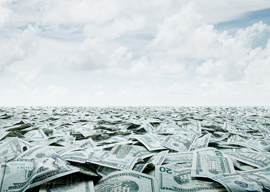
May 13, 2016

Source: Bigstock
God help Donald Trump’s critics. The paroxysms they have after the mogul”turned”GOP nominee’s policy pronouncements can”t be good for their health.
The latest is a real hoot. For dealing with our enormous national debt, Trump wants to do what he does best: negotiate with creditors. How so? By pressuring bondholders to accept a haircut on their payments. And if they don”t like the terms? Well, they”ll get their money by hook or by crook.
In an interview with CNBC’s Squawk Box, Trump gave a brutally honest take on our dismal fiscal prospects. “We owe so much money”nobody talks about it. Nobody talks about it until the bubble pops,” he told the stone-faced hosts. When asked if he thought the U.S. government should pay 100 cents on the dollar for its debt, Trump replied, “I would borrow knowing that if the economy crashed you could make a deal. And if the economy was good it was good so therefore you can”t lose.”
On CNN, Trump clarified his comments and declared that the U.S. government would never default on its debt “because you print the money.” He went further, stating, “If we have an opportunity where interest rates go up and you can buy debt back at a discount, I always like to be able to do that if you can do it.”
Like a curious child touching a hot pan handle, the outcry from the financial commentariat was piercing.
The New York Times described Trump’s comments as having “no modern precedent.” Patrick Chovanec of the Silvercrest Asset Management Group called it “irresponsible talk.” The Economist said it was a “completely nonsensical idea.” Kevin Drum of Mother Jones proclaimed that “Donald Trump Still Has No Idea How Government Debt Works.” One of the #NeverTrump crybabies at the RedState blog asked, “Are we sufficiently panicked, yet?”
In 2016, eight years after the financial crisis, it’s hard to take any mainstream voice seriously on economics. The very people who missed the housing bubble, and the subsequent damage done to the average man’s 401(k), are in no position to criticize Trump’s sober approach to national finance.
So what’s so radical about Trump’s proposal? Why can a corporation discount its bonds and screw over bondholders, but not the feds?
The argument goes that our financial system is based around U.S. Treasury bonds being a rock-solid form of collateral. They are supposed to be a guaranteed investment will little to no risk because Washington isn”t running out of cash anytime soon. The government maintains the power to fleece taxpayers, hence the supply of funds never runs out.
To say that U.S. treasuries may not be worth their full value in the future devalues them in the eyes of investors. It scares away potential buyers and makes current bondholders all the more jittery about their portfolio. A massive sell-off could happen, boosting interest rates and increasing borrowing costs, putting Washington even further in debt. A financial depression comes next, with fiery Armageddon not far behind.
Of course, observers are focused on the short-run ramifications of shortchanging bondholders rather than the core issue: the government’s retardedly large amount of debt.
The root problem is the ease with which the dollar is devalued. As the world’s reserve currency, King Dollar has a lot of prestige on the global stage. Demand for it is based on countries being able to use it to settle international transactions. That high standing has been milked by the government for decades, to the point where we have enough debt to make the Empire State Building look like a Christmas miniature.
The ability to manufacture dollars ex nihilo means that no lawmaker in Washington will tackle the debt in a meaningful way. The fiat money is plentiful. And any cut to government programs usually brings early retirement. The country is addicted to government spending. The unspoken plan in Congress is to keep spending, keep borrowing, and keep covering the cost by printing money until…something happens. What that is, we”re never told.